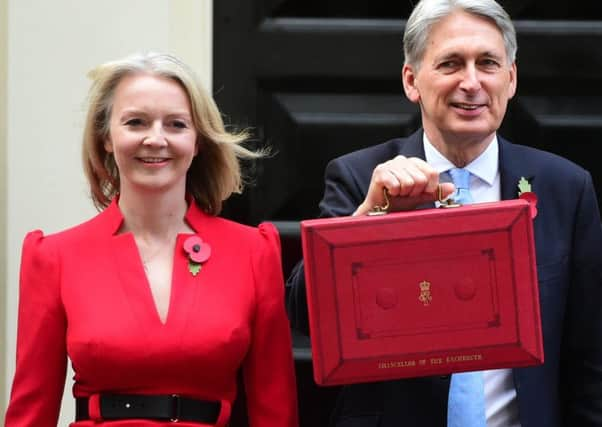IFS warns that Budget is a '˜gamble'


The Institute for Fiscal Studies (IFS) said the Chancellor “painted himself into a corner” by using a windfall from revised borrowing forecasts to fund increased spending on the NHS, and said tax rises were “all but inevitable” to pay for the pressure from an ageing population.
IFS director Paul Johnson said any hope of meeting a target to eliminate the deficit by the mid-2020s was “for the birds”.
Advertisement
Hide AdAdvertisement
Hide AdAnd despite the Budget’s boost for the health service in England of £20.5 billion higher spending by 2023-24, Mr Johnson said austerity had “not yet” come to an end, because of the continued squeeze on other areas.
“This is no bonanza,” Mr Johnson said. “Cuts are not about to be reversed.
“If I were a prison governor, a local authority chief executive or a headteacher I would struggle to find much to celebrate. I would be preparing for more difficult years ahead.”
The IFS and Resolution Foundation think tanks both said rises in income tax thresholds would benefit the wealthy more than those less well-off, with a typical higher rate taxpayer gaining £176 a year and a basic rate payer gaining just £24.
Mr Johnson said there would be “millions of losers” from the introduction of Universal Credit, despite an injection of around £2bn per year to ease the transition to the controversial new benefit.
And IFS research economist Ben Zaranko added that with £4bn of welfare cuts still planned, “the end of austerity is not in sight in that area”.
The SNP’s Westminster economy spokeswoman Kirsty Blackman said the warnings showed why the government must “ditch their reckless plans for an extreme Brexit, which would cause decades of damage to the economy, jobs and living standards”.
She said: “People have suffered enough under years of Tory austerity cuts, and these warnings from the IFS underline exactly what’s at stake in the event of a devastating hard or no-deal Brexit.”
Advertisement
Hide AdAdvertisement
Hide AdTheresa May denied suggestions that the £100bn giveaway including tax cuts for 32 million workers was preparing the ground for a snap election.“No,” she told journalists in Oslo. “We are not preparing for another general election. That would not be in the national interest.”
Mr Hammond also insisted there was no early election on the way, replying when asked if the government was preparing for a snap vote: “I hope not.”
The Chancellor denied he had “abandoned fiscal rectitude” but claimed a good Brexit deal could trigger more tax cuts and further boosts to public spending.
John McDonnell, his Labour opposite number, used his response to the Budget in the Commons to claim the Prime Minister had “dashed the hopes” of millions of workers her claim that austerity was over. “At best, they got what the Chancellor described as ‘little extras’,” the shadow Chancellor said, referring to extra education spending worth £10,000 per primary and £50,000 per secondary school.
“No wonder there are so many teachers, police officers, local councillors who feel bitterly disappointed at the Prime Minister’s broken promise.”
But Mr McDonnell faced a backlash of his own after saying Labour would support the government’s tax cuts for the middle class. The shadow Chancellor said public sector workers like head teachers had a “rough time” in recent years and deserved a tax cut.
But critics within Labour said the move was wrong while there are “people dying on British streets” from the impact of benefits cuts.
The cuts were criticised as “tax cuts for the rich” by shadow foreign secretary Emily Thornberry on Monday.
Advertisement
Hide AdAdvertisement
Hide AdAndy Burnham, mayor of Greater Manchester, said when he heard that the party “would be backing Philip Hammond’s tax cuts for the richest” it sent a “shiver down my spine”. In an article for The Times, he wrote: “I honestly can’t see how Labour’s position will hold. It is not just that the distribution is so unfair.”
Former work and pensions secretary Yvette Cooper tweeted: “People on £90-100k a year will get tax cut worth £860 in April, those on £125k will get £600 – far more than low-paid workers, at a time when child poverty is going up, benefits are being cut, vital council services are being cut, police are badly overstretched. This is wrong.”